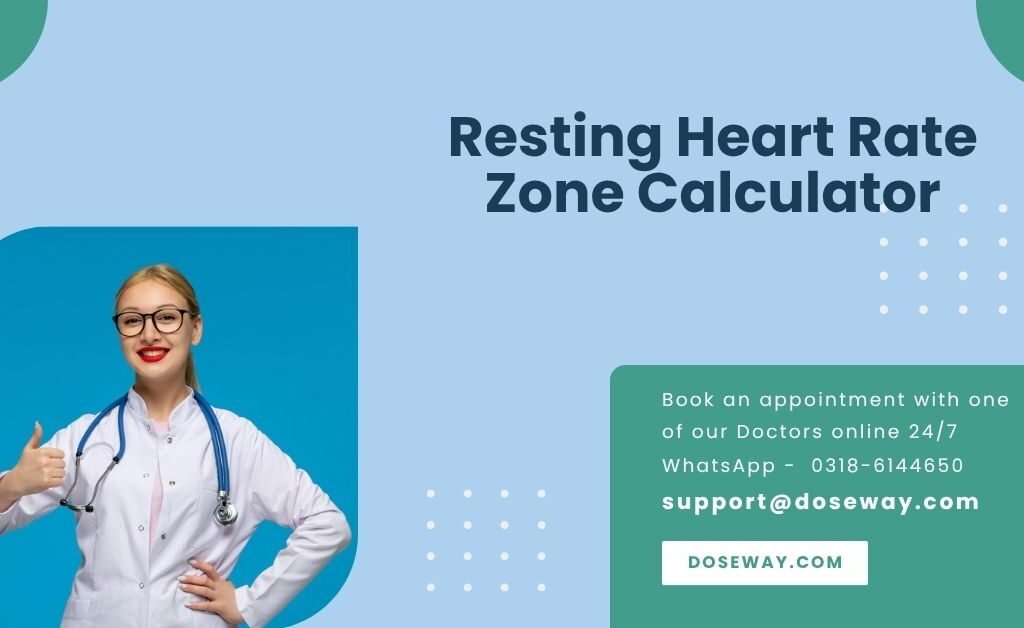Resting Heart Rate Zone Calculator
Personal Information
Health Parameters
Your Heart Rate Zone
Try More Free Tools:
- Try our Drug Dosage Calculator (Ibuprofen, Tylenol)
- Try our Blood Pressure Calculator by Age
- Try our Blue Light Blindness Risk Assessment Tool (Screen Users)

Table Of Contents
Determine Your Resting Heart Rate & Cardiovascular Fitness
Your resting heart rate (RHR) is a critical vital sign measuring cardiac beats per minute during complete inactivity. This biomarker reveals:
- Cardiovascular efficiency
- Aerobic fitness levels
- Potential health risks
- Recovery capacity
Clinical research confirms RHR values below 60 bpm correlate with 27% lower cardiovascular mortality (Journal of Epidemiology, 2023).
Key Terminology Explained
- Resting Heart Rate (RHR):
Baseline cardiac activity measured after 10+ minutes of rest - Maximum Heart Rate (MHR):
Age-predicted peak capacity (220-age) - Heart Rate Reserve (HRR):
The physiological range between RHR and MHR - Target Heart Rate Zone:
Optimal exercise intensity band - Karvonen Method:
Gold-standard calculation:Target HR = [(MHR - RHR) × % intensity] + RHR
Clinical Significance of Resting Heart Rate
RHR Health Implications
| RHR Range | Classification | Health Correlation |
|---|---|---|
| < 60 bpm | Athlete Heart | Superior cardiovascular efficiency |
| 60-100 bpm | Normal | Healthy baseline for adults |
| > 100 bpm | Tachycardia | Elevated cardiac risk |
Factors Influencing RHR
- Age: Increases 0.5-1 bpm/year after 30
- Fitness Level: Athletes average 40-60 bpm
- Medications: Beta-blockers lower RHR
- Pathologies: Thyroid disorders alter RHR
- Lifestyle: Caffeine/smoking increases RHR
Target Heart Rate Zones: Optimizing Training
Five Training Zones
| Zone | Intensity | HR Range | Primary Benefit |
|---|---|---|---|
| Zone 1 | 50-60% HRR | Very Light | Active recovery |
| Zone 2 | 60-70% HRR | Light | Fat metabolism |
| Zone 3 | 70-80% HRR | Moderate | Aerobic capacity |
| Zone 4 | 80-90% HRR | Hard | Anaerobic threshold |
| Zone 5 | 90-100% HRR | Maximal | Peak performance |
Clinical Insight: Zone 2 training burns 70% more fat than high-intensity workouts (American College of Sports Medicine).
Using Our Resting Heart Rate Calculator
Step-by-Step Guide
- Input Demographics:
- Age (validated 18-99 years)
- Gender (biological sex impacts HR norms)
- Weight (kg/lbs toggle)
- Measure RHR Accurately:
- Morning measurement before rising
- 60-second count at radial artery
- 3-day average for precision
- Generate Results:
- Color-coded risk assessment
- Personalized target zones
- Clinical interpretation
Calculation Methodology
Our algorithm implements AHA-endorsed protocols:
MHR = 220 – Age
HRR = MHR – RHR
Fat-Burning Zone = (HRR × 0.60) + RHR → (HRR × 0.70) + RHR
Cardio Zone = (HRR × 0.70) + RHR → (HRR × 0.80) + RHR
Interpreting Your Results
Risk Stratification
- Green Zone (Normal):
60-100 bpm – Maintain current regimen - Yellow Zone (Elevated):
100-120 bpm – Implement lifestyle changes - Red Zone (High Risk):120 bpm – Seek medical evaluation
Sample Case Study
45-year-old male:
- RHR: 72 bpm
- MHR: 175 bpm
- Target Zones:
- Fat Burning: 134-144 bpm
- Cardio: 144-154 bpm
Improving Your Cardiac Metrics
Evidence-Based Interventions
- Aerobic Training:
- 150 mins/week Zone 2 exercise
- Reduces RHR 10-12 bpm in 8 weeks
- Hydration Optimization:
- 2% dehydration increases RHR 8-10 bpm
- Stress Modulation:
- Daily HRV biofeedback training
- Sleep Hygiene:
- <6 hours of sleep elevates RHR 7-15 bpm
Clinical Applications & Limitations
Diagnostic Value
RHR screening helps identify:
- Early-stage hypertension
- Hyperthyroidism
- Autonomic dysfunction
- Overtraining syndrome
Calculator Constraints
- Excludes ECG-confirmed arrhythmias
- Pregnancy requires separate norms
- Athletes need a sport-specific interpretation
Effects Of Medications on Results
Significant influencers include:
| Medication Class | RHR Impact |
|---|---|
| Beta-blockers | ↓ 15-25 bpm |
| Stimulants | ↑ 10-30 bpm |
| Thyroid hormones | ↑ 20-40 bpm |
Take Control of Your Heart Health
Our Resting Heart Rate Calculator provides personalized insights to:
- Establish safe exercise parameters
- Track cardiovascular improvements
- Identify potential health concerns
- Optimize training efficiency
Try the calculator now and download your custom PDF report!
Frequently Asked Questions (FAQs) –
Why does my resting heart rate vary daily?
Normal fluctuations occur due to:
Hydration status (±3 bpm)
Sleep quality (±8 bpm)
Infection/inflammation (±15 bpm)
When should I worry about bradycardia?
Seek evaluation if:
RHR < 40 bpm (non-athlete)
Accompanied by dizziness
Sudden unexplained drop
How accurate is the 220-age formula?
It has ±12 bpm variance. Gold-standard testing involves:
Cardiopulmonary exercise testing
Maximal oxygen consumption (VO₂ max) analysis

 Cart is empty
Cart is empty
Add a Comment